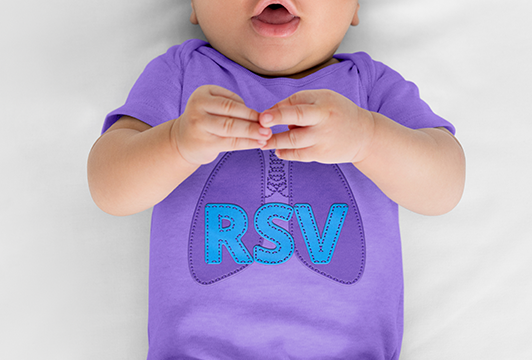About RSV
Respiratory syncytial virus (RSV) is a common, highly contagious virus that can compromise the lungs and breathing passages. RSV can cause serious infections that can lead to hospitalizations and may be life-threatening.1,2
Proportion of infant RSV hospitalizations by age in months, across data sources*


Adapted from Parikh RC et al.3









Who’s at high risk for severe RSV infection?

Premature infants4

Infants (≤ 6 months)4

Infants with certain underlying conditions5
e.g. Chronic lung disease | Congenital heart disease
The impact of RSV in infants



Infants < 1 year of age have more severe RSV disease.7

Leading cause of hospitalization for children aged < 1 year in Canada.8*

Leading cause of LRTI in young children9†

Attributable costs for ARI attributed to RSV cases were substantially higher in the first 3 months. 8*
Raise RSV awareness in new parents and expecting parents to lessen the impact of RSV.
LRTI: lower respiratory tract infection; ARI: acute respiratory infection
*Based on a retrospective case-control study to estimate the attributable healthcare costs per RSV case in Alberta.
†Based on a prospective cohort study among children aged 0–35 months in Quebec City.

Short quiz!
Take the three-question quiz to test your knowledge.
Begin
1/3
More than 50% of hospitalizations in infants occur in the first 3 months of life.
- True
- False
1/3
Correct!
- Previous
- Next
1/3
This is true.
More than 50% of hospitalizations occur in the first 3 months of life, and > 75% of hospitalizations occur in the first 6 months.3
- Previous
- Next
2/3
Only infants with underlying conditions are at risk of RSV.
- True
- False
2/3
This is false.
Of infants hospitalized for RSV disease, 67% were born at term with no underlying conditions.6
- Previous
- Next
2/3
Correct!
- Previous
- Next
3/3
RSV is the leading cause of hospitalization for children aged < 1 year in Canada.
- True
- False
3/3
Correct!
- Previous
- Next
3/3
This is true.
RSV is the leading cause of hospitalization for children aged < 1 year in Canada.8*
- Previous
- Next
*Based on a retrospective case-control study to estimate the attributable
healthcare costs per RSV case in Alberta.
Learn more about how RSV affects older adults.
- Take the quiz on older adults
- Retake Quiz



